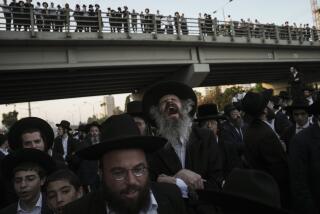MIDEAST : Rifts Widen Among Israel’s Jews as Orthodox Star Rises
- Share via
JERUSALEM — Tensions between Israel’s religious establishment and more liberal branches of Judaism broke into the open this week when leaders of the country’s tiny Reform and Conservative movements charged that the Sephardic chief rabbi had advocated the murder of non-Orthodox Jews.
Rabbi Eliahu Bashki-Doron denied that he was inciting violence with a sermon from the biblical Book of Numbers broadcast on a pirate radio station Saturday night in which he described an Israelite who had sexual relations with a Gentile as “the first Reform Jew” and his murder by a fellow Jew, Phinehas, as a “pure” act.
Reform and Conservative rabbis accused Bashki-Doron of failing to heed the lessons of the murder of Prime Minister Yitzhak Rabin in November by a Jewish law student who justified the assassination on religious grounds.
“I am surprised that he has not learned the basic lesson of our fathers, that wise men should beware of what they say,” Conservative Rabbi Ehud Bandel said. “Eight months after the assassination of Rabin, he should have seen where such words can lead.”
The row is a sign of the growing concern among Reform and Conservative Jews over the May 29 election victory of Orthodox political parties. They won an unprecedented 23 seats in the 120-member parliament and a key role in the new government. The Reform and Conservative Jews fear that the Orthodox parties’ newfound strength will be used to combat their struggle for equal rights and pluralism in religious teachings--and apparently it will be.
A majority of Israel’s estimated 4.5 million Jews are secular or nonobservant. Among the religious population--an estimated 20% to 30%--there are only about 5,000 Reform Jews and 20,000 Conservative Jews, compared with about 85% of the nearly 6 million American Jews.
The Orthodox rabbinate, Israel’s only religious authority, does not recognize Reform and Conservative conversions to Judaism. Such converts are classified as Jews by the state and may immigrate to Israel, but Orthodox rabbis will not marry or bury them in the Holy Land, where there are no civil ceremonies.
The rabbinate also prohibits Reform and Conservative rabbis from performing marriages, burials or conversions in Israel.
Last year, the Israeli Supreme Court ruled there was nothing in Israeli law to prevent non-Orthodox rabbis from performing such ceremonies. The religious parties now want to pass legislation banning ceremonies by non-Orthodox rabbis, whom they view as instruments of assimilation. The Orthodox see themselves as upholding traditions that have guaranteed the survival of Judaism against generations of hostilities.
“My understanding is the understanding of 3,000 years or so of Judaism,” said Rabbi Abraham Ravitz, one of four members of parliament from the United Torah Judaism party. “We feel that to explain Judaism and perform ceremonies the way the Reform are doing, it’s not Judaism. We believe there are other people in the world: Buddhists, Muslims, Christians. You could have Reform. But everyone has a name, and our name is Jewish.”
Reform and Conservative leaders respond that the Orthodox are trying to impose their religious views and, in doing so, are pushing away all Jews who do not agree with them.
They fear that Prime Minister Benjamin Netanyahu, whose government depends on the 23 religious votes, will back the Orthodox drive to remain the exclusive voice of Judaism.
For that reason, they have refused to sign a statement of support for the new government presented by the United Jewish Appeal and Jewish federations.
“The prime minister has not yet acted in any way to cause us to scream gevalt,” said Rabbi Sheldon Zimmerman, president of the Reform movement’s Hebrew Union College. “But the reality is we are watching and waiting and hoping he will not give in to his partners. We are concerned that the ultra-Orthodox will use their power slowly but surely to exclude progressive Jews.”
Bandel, of the Conservative movement, added that the battle was not just about the role of rabbis but about “the very nature of Israel as a democratic society and not, God forbid, as a theocracy. The issue is what kind of an Israel are we going to have? An enlightened one, or a theocratic, nationalistic nondemocratic one?”
More to Read
Sign up for Essential California
The most important California stories and recommendations in your inbox every morning.
You may occasionally receive promotional content from the Los Angeles Times.













